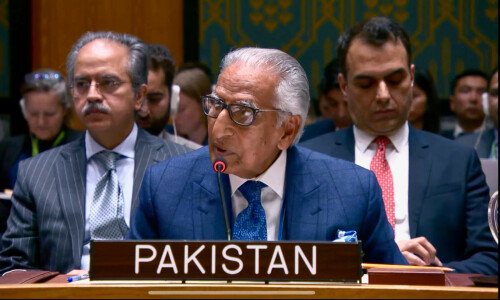KARACHI: The Sindh High Court has expressed concerns over the provincial authorities for delaying the approval of a proposed project to detain dogs and release them after sterilisation and vaccination and granted a last chance to authorities to complete the process within 20 days.
A two-judge bench headed by Justice Mohammad Ali Mazhar also asked the local administration to communicate their problems to a task force, recently constituted to help it about detention and control of stray/street dogs, and directed the task force to resolve these issues on an urgent basis.
The bench observed that health authorities had been submitting that they maintained appropriate inventory of anti-rabies vaccine at the government hospitals across the province, but recently a boy bitten by dogs in Larkana was shifted to Karachi in a serious condition and later he died.
It directed the additional secretary of the health department to ask the medical superintendent of the Chandka Medical College Hospital, Larkana, as well as the National Institute of Child Health to determine whether the child was vaccinated.
The bench was hearing a petition about the rise in dog-bites cases in the province and shortage of anti-rabies vaccines at government-run hospitals.
The SHC sees no justification in delaying the plan’s approval
In October, the local government secretary had submitted that a project — Street dog population control and fight against rabies — had been launched with the help of the Society for the Protection of Animal Rights, adding that the PC-I of the proposed project would be prepared within a week and submitted to the planning and development (P&D) department for approval.
Since then, the bench has been issuing directives to the authorities concerned time and again to expedite the process.
However, an official of the local government department filed a progress report stating that the PC-I of the proposed project with a cost of Rs1.074 billion had been forwarded to the chairperson of the planning and devolvement board on Dec 18 for approval.
The bench observed that even the PC-I was sent on Dec 18, which showed that the matter was being delayed without any justification although a larger public interest was involved and government functionaries should take it seriously.
The bench further said that the district municipal corporations (DMCs) and cantonment boards had been submitting progress reports, but the local government department was still at the approval stage of the proposed project and such matter could not be left unattended for an unlimited period.
“As a last chance, we allow 20 days’ time to the Secretary, Local Government Department, Government of Sindh, and the Chairperson Planning & Development Board to consider the PC-I and after its due approval forward the same with summary to the worthy Chief Minister Sindh, so that further action may be taken at their end for the approval of scheme and immediately after approval, the programme should be launched in Sindh and for general awareness, the public message should be released in print and electronic media,” it added.
The bench further said that while launching the programme some complaint cells or a helpline may also be made and directed all the DMCs and cantonment boards to continue their campaign against stray dogs and submit further progress reports on the next hearing.
Plea against bar association disposed
The same bench has disposed of a petition against a bar association for locking the main entrances of the SHC during a boycott of courts after the president of Sindh High Court Bar Association (SHCBA) submitted that the bar had neither blocked the doors nor would any such act be done in future.
Some 22 lawyers jointly moved the SHC seeking directives to ensure that the petitioners and litigants were provided unhindered and smooth access to the court premises on working days including the days on which the strike calls were given by the bar councils and associations.
They submitted that during the strike period, the gates of SHC were blocked by the office-bearers of the SHCBA and litigants and lawyers were not allowed access to the court building.
The petitioners further argued that they had no complaint against the strike calls, but they were perturbed by the resistance and force to bar the entry in court.
The bench issued notices to the leadership of the SHCBA and Karachi Bar Association. SHCBA President Zia-ul-Makhdoom in his statement stated that they only persuaded and convinced their bar members not to join court proceedings on strike days, but neither had they ever closed or locked the gates of SHC nor would any such act be done in future.
On the basis of the statement of the SHCBA’s president, the petitioners sought the disposal of the petition and the bench had taken the statement of the SHCBA chief on record and disposed of the matter.
Published in Dawn, December 24th, 2019


















































